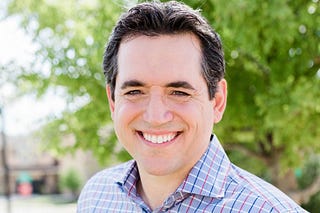Texas Republicans have nominated candidates for public office in primaries since the GOP became a relevant force in Texas politics. However, Republican Party of Texas State Chairman Matt Rinaldi has signaled his willingness to support changes to the way Republican Party nominees are chosen in Texas that would disenfranchise grassroots primary voters and transfer the power to choose nominees to a small group of party bosses and insiders.
In a recent interview on an episode of the “Conservative Review with Daniel Horowitz” podcast entitled “Why Do Texas Republicans Suck?”, Rinaldi endorsed changes to how Republican nominees are chosen and opened the door to nominating candidates at conventions instead of by voters in primaries.

Subscribe to The Texas Voice
Have every new edition of The Texas Voice sent direct to your inbox
Before the implementation of primaries, which became commonplace throughout the United States beginning in the late 19th and early 20th centuries, nominees of political parties were chosen by party bosses and political elites at conventions in the proverbial “smoke-filled room.” In response to growing concerns about the corruption of party bosses and the machine-style politics that empowered them, reformers sought to shift control of candidate nominations away from party bosses and into the hands of voters. In Texas, major political parties that have reached a certain threshold of support have been required to hold primaries since 1906.
With the creation of political primaries, ordinary citizens were given a voice in choosing a political party’s nominee.
In his interview with Rinaldi, podcast host Daniel Horowitz advocated for replacing primaries with nominating caucuses or conventions.
“The only way we’re ever going to level the playing field to elect a critical mass of conservatives in one or two election cycles is to do away with popular primaries and have some sort of filtered caucus or convention representative democracy system,” said Horowtiz.
When Horwitz asked Rinaldi if that could be achieved, Rinaldi responded, “Yeah, and you’re not going to do it legislatively.” Rinaldi then discussed a 2011 ruling from a United States District Judge in Idaho that found an Idaho state law requiring open primaries unconstitutional. The ruling was not appealed, and the Idaho legislature subsequently passed a law implementing a closed primary system.
Rinaldi also opened the door to conventions in place of primaries and other changes that would give the party veto power over candidates. “You can presumably do that with a convention as well. Or states like Tennessee, states like Alabama, the Party has the ability to deny ballot access to candidates that they don’t believe represent them,” said Rinaldi. “The party needs to take a more active role in protecting its brand, and it does that by choosing how we elect our candidates who represent us.”
Following up on Rinaldi’s comments, Horowitz asked, “So you are saying is this a fight you’re willing to pick and say the party at your convention might be willing to adopt an election down the road to start with some sort of modified convention system?”
Rinaldi replied, “I mean, I’m willing. Ultimately, what I do as chairman is I am the will of the party delegates, right? So that’s a fight they want to pick, I’ll be their spokesman. Certainly.”
Under legal precedent, states can regulate political parties to the extent that there is a compelling state interest to do so. Based on opinions written by conservative jurists, including the late United State Supreme Court Justice Antonin Scalia, Rinaldi and the Republican Party of Texas would face an uphill battle should they attempt to choose nominees outside of the primary process prescribed by state law.
In 2000, a 7-2 majority of the United States Supreme Court, in the case of California Democratic Party v. Jones, struck down a voter-approved proposition in California that created a so-called “blanket” primary. While the decision recognized the First Amendment rights of political parties, it also recognized states’ legitimate role in the electoral process, including requiring primaries to nominate candidates.
Justice Scalia wrote for the majority: “We have recognized, of course, that States have a major role to play in structuring and monitoring the election process, including primaries. See Burdick v. Takushi, 504 U. S. 428,433 (1992); Tashjian v. Republican Party of Conn., 479 U. S. 208, 217 (1986). We have considered it “too plain for argument,” for example, that a State may require parties to use the primary format for selecting their nominees, in order to assure that intraparty competition is resolved in a democratic fashion. American Party of Tex. v. White, 415 U. S. 767, 781 (1974); see also Tashjian, supra, at 237 (SCALIA, J., dissenting).”
Justice Scalia again reiterated that the ability of a state to require a political party to nominate candidates in a primary was “too plain for argument” in his 2008 opinion in the case of New York State Bd. of Elections v. Lopez Torres.
A 1992 opinion from the Ninth Circuit Court of Appeals took a closer look at the compelling state interest that exists in requiring political parties to nominate candidates in a primary.
In the case of Lightfoot v. Eu, the Libertarian Party challenged a California statute that required political parties to nominate candidates in primaries instead of conventions. The Ninth Circuit upheld the law requiring primaries.
Judge Cynthia Holcombe Hall, a Reagan nominee to the Ninth Circuit who Reagan also shortlisted for a potential nomination to the United States Supreme Court, wrote the opinion upholding the statute.
Judge Hall’s opinion reads, in the relevant part, as follows:
“The State justifies the direct primary requirement as a Progressive Era reform designed “to take political nominations out of the smoke-filled rooms of party bosses and give them to the voters.” The direct primary was one of several measures conceived of by the Progressives to destroy what they viewed as “the corrupt alliance” between wealthy special interests and the political machine. Richard Hofstadter, The Age of Reform 257 (Vintage Books 1955). The Progressives believed democracy should be something greater than competition between political parties. Id. at 263. They viewed the direct primary as a vital weapon in their battle to “make government accessible to the superior disinterestedness and honesty of the average citizen. Then, with the power of the bosses broken or crippled, it would be possible to check the incursions of the interests upon the welfare of the people and realize a cleaner, more efficient government.” Id. at 257. We can imagine no government interest more compelling. Though honest people may debate the success of the direct primary in producing the kind of government the Progressives envisioned, it is a means sufficiently tailored to its ends to satisfy the Constitution. Indeed, if the goal of California’s Progressive reformers was to deliver power over the political process from the hands of party bosses and special interests into those of the people, no measure short of the direct primary would be adequate. We therefore hold that the State’s interest in enhancing the democratic character of the election process overrides whatever interest the Party has in designing its own rules for nominating candidates.”
In the opinion’s conclusion, Judge Hall also wrote, “Turning the entire electoral apparatus over to political parties would pose as great a threat to the integrity of our system of government as would the state’s unprincipled meddling in the political process. This recognition informs the Supreme Court’s direction to lower courts to strike a balance between the interests of the parties and those of the state that will best enhance the democratic character of our system.”
The Ninth Circuit again upheld the constitutionality of state laws requiring nomination by primary in 2008, in the case of Alaska Independence Party v. State of Alaska.
More recently, in 2018, the Tenth Circuit Court of Appeals upheld a Utah law that allowed candidates for a party nomination to obtain primary ballot access without going through a party’s convention process. Under the governing documents of the Utah Republican Party, a candidate would automatically become the Party’s nominee if they were unopposed or received more than 60% of delegate votes at the Party’s nominating convention. If no candidate reached the 60% threshold, the two candidates who received the highest number of delegate votes would proceed to a primary ballot.
The Utah Republican Party appealed the case to the United States Supreme Court. The Supreme Court declined to take up the case, thus leaving the Tenth Circuit ruling upholding the Utah law in effect.







